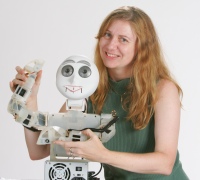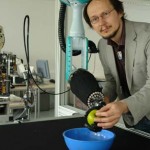Maja Matarić | University of Southern California

Maja Matarić is professor and Chan Soon-Shiong chair in Computer Science, Neuroscience, and Pediatrics at the University of Southern California, founding director of the USC Center for Robotics and Embedded Systems, co-director of the USC Robotics Research Lab and Vice Dean for Research in the USC Viterbi School of Engineering. She received her PhD in Computer Science and Artificial Intelligence from MIT in 1994, MS in Computer Science from MIT in 1990, and BS in Computer Science from the University of Kansas in 1987. She is a Fellow of the American Association for the Advancement of Science (AAAS), Fellow of the IEEE, and recipient of the Presidential Awards for Excellence in Science, Mathematics & Engineering Mentoring (PAESMEM), the Anita Borg Institute Women of Vision Award for Innovation, Okawa Foundation Award, NSF Career Award, the MIT TR100 Innovation Award, and the IEEE Robotics and Automation Society Early Career Award. She served as the elected president of the USC faculty and the Academic Senate. At USC she has been awarded the Viterbi School of Engineering Service Award and Junior Research Award, the Provost’s Center for Interdisciplinary Research Fellowship, the Mellon Mentoring Award, the Academic Senate Distinguished Faculty Service Award, and a Remarkable Woman Award. She is featured in the science documentary movie “Me & Isaac Newton”, in The New Yorker (“Robots that Care” by Jerome Groopman, 2009), Popular Science (“The New Face of Autism Therapy”, 2010), the IEEE Spectrum (“Caregiver Robots”, 2010), and is one of the LA Times Magazine 2010 Visionaries. Prof. Matarić is an associate editor of three major journals and has published extensively. She serves or has recently servied on a number of advisory boards, including the National Science Foundation Computing and Information Sciences and Engineering (CISE) Division Advisory Committee, and the Willow Garage and Evolution Robotics Scientific Advisory Boards. Prof. Matarić is actively involved in K-12 educational outreach, having obtained federal and corporate grants to develop free open-source curricular materials for elementary and middle-school robotics courses in order to engage student interest in science, technology, engineering, and math (STEM) topics. Her Interaction Lab’s research into socially assistive robotics is aimed at endowing robots with the ability to help people through individual non-contact assistance in convalescence, rehabilitation, training, and education. Her research is currently developing robot-assisted therapies for children with autism spectrum disorders, stroke and traumatic brain injury survivors, and individuals with Alzheimer’s Disease and other forms of dementia. Details about her research are found at robotics.usc.edu/interaction/.
Maja Pantic | Imperial College London

Maja Pantic obtained her PhD degree in computer science in 2001 from Delft University of Technology, the Netherlands. Until 2005, she was an Assistant/ Associate Professor at Delft University of Technology. In 2006, she joined the Imperial College London, Department of Computing, UK, where she is Professor of Affective & Behavioural Computing and the Head of the iBUG group, working on machine analysis of human non-verbal behaviour. From November 2006, she also holds an appointment as the Professor of Affective & Behavioural Computing at the University of Twente, the Netherlands.
In 2007, for her research on Machine Analysis of Human Naturalistic Behavior (MAHNOB), she received European Research Council Starting Grant (ERC StG) as one of 2% best junior scientists in any research field in Europe. She was also the Scientific Director of the large European project on Social Signal Processing (2009-2013). In 2011, Prof. Pantic received BCS Roger Needham Award, awarded annually to a UK based researcher for a distinguished research contribution in computer science within ten years of their PhD.
She is the Editor in Chief of the Image and Vision Computing Journal (IVCJ/ IMAVIS), Associate Editor of the IEEE Transactions on Systems, Man, and Cybernetics – Part B: Cybernetics (IEEE TSMC-B), Associate Editor of the IEEE Transactions on Pattern Analysis and Machine Intelligenve (IEEE TPAMI), and a member of the Steering Committee of the IEEE Transactions on Affective Computing. She is an IEEE Fellow.
Prof. Pantic is one of the world’s leading experts in the research on machine understanding of human behavior including vision-based detection, tracking, and analysis of human behavioral cues like facial expressions and body gestures, and multimodal analysis of human behaviors like laughter, social signals, and affective states. She is also one of the pioneers in design and development of fully automatic, affect-sensitive human-centered anticipatory interfaces, built for humans based on human models. She has published more than 150 technical papers in the areas of machine analysis of facial expressions and emotions, machine analysis of human body gestures, and human-computer interaction. Her work is widely cited and has more than25 popular press coverage (including New Scientist, BBC Radio, and NL TV 1 and 3).
For more information visit Maja Pantic’s Page and the website of the Intelligent Behaviour Understanding Group
Helge Ritter | Bielefeld University

Helge Ritter studied physics and mathematics at the Universities of Bayreuth, Heidelberg and Munich and received a Ph.D. in Physics from the Technical University of Munich in 1988. Since 1985, he has been engaged in research in the field of neural networks. In 1989 he moved as a guest scientist to the Laboratory of Computer and Information Science at Helsinki University of Technology. Subsequently he was assistant research professor at the then newly established Beckman Institute for Advanced Science and Technology and the Department of Physics at the University of Illinois at Urbana-Champaign. Since 1990, he is professor at the Department of Information Science, University of Bielefeld. In 1995, Helge Ritter spent one year as a fellow at the Institute of Advanced Studies in Berlin. His main interests are principles of neural computation, in particular self-organizing and learning systems, and their application to robot cognition, data analysis and interactive man-machine interfaces. In 1999, Helge Ritter was awarded the SEL Alcatel Research Prize and in 2001 the Leibniz Prize of the German Research Foundation DFG. Helge Ritter is co-founder and one of the directors of the Bielefeld Institute of Cognition and Robotics (CoR-Lab) and coordinator of the excellence cluster “Cognitive Interaction Technology”.


